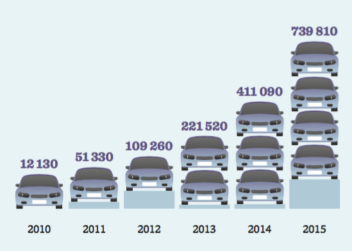EV owners’ range anxiety soon a thing of the past
In a few years we’ll be able to charge virtually wherever and whenever we want with only minimal buildout of the power grid, according to electrical engineering professor Magnus Korpås.
EV owners want to charge their cars quickly, but too many fast chargers require a lot of power.
The question is how to build a good charging infrastructure that allows us to recharge EVs without overloading the power grid, says Korpås, who is researching just this question. He is a professor in the Department of Electrical Engineering at NTNU.
“I have a vision for Norwegian electric vehicle development. In a few years we’ll be able to charge virtually wherever and whenever we want, without needing to expand the power grid more than is absolutely necessary. [This scenario] requires smart charging strategies. This is important for the power grid but also for electric car owners – who shouldn’t have to worry about whether their battery is charged when they want to use the car,” he says.

People who choose electric cars are contributing to a green change. Magnus Korpås believes that they shouldn’t feel guilty because their electric cars aren’t yet powered solely from renewable sources.
Electric vehicles contribute to system change
Korpås points out that many EV owners park and charge their cars, even though they won’t be driving them until the next day. Perhaps in the future electricity will be cheaper if you charge your EV during periods of low demand for the grid.
“We’re also looking into how EVs can be used as backup power sources. In Norway this may be less relevant, because we have so much flexible hydropower – but in countries like Denmark, it’s different. If something fails in the power grid and power production drops, we can reverse the charging current so that electric cars can supply electricity back to the power grid,” says Korpås.
“We’re also looking into how EVs can be used as backup power sources.”
Car owners who choose an electric vehicle rather than conventional petrol or diesel cars are helping to move the energy system in a more environmentally friendly direction. Korpås believes people shouldn’t feel guilty that electric cars are not powered by 100% renewable sources yet.
Need to see an EV green audit
Instead, he believes that we need to view electric car development from a 10-20 year perspective. As we replace fossil fuels with renewable energy, we will gradually replace the fossil fleet with electric vehicles.
“The electrification of the transport sector is an important part of transforming the energy system, and it’s necessary if Norway and Europe are to reach climate targets. When we charge our electric cars we use more electricity, and in the short term this power consumption has to be covered by fossil fuels, through Norway exporting less hydropower. As long as Norway and our neighbouring countries continue to develop renewable energy rather than build new fossil fuel power plants, electric cars will primarily use renewable power,” says Korpås.
EV development has to be viewed in the context of a larger shift to a renewable energy system. Korpås emphasizes that it is important for scientists to map the overall picture – that is, EVs’ total environmental impact.

Professor Ann Mari Svensson conducts research on the technology behind the new batteries, and how batteries can be made more environmentally friendly, stable and cheaper. She believes that in five years electrical cars will have a range of around 500 kilometres.
That means also considering the car batteries. Korpås says NTNU researchers are now starting a new research project to assess the life cycle of electric vehicles in Europe. The project will take into account both the cars’ energy and environmental impacts.
Hope for hydrogen?
Korpås is also researching hydrogen as an energy carrier, but the development in this area has not been as fast as for battery technology. Even if we are able to use hydrogen as a fuel in cars, trains, ships and planes down the road, he is unsure of the extent.
“I think the reason there aren’t more EVs achieving this range is that automakers are deliberately holding back so as not to compete with themselves.”
However, Korpås says, “it’s still important for us to continue with serious research on energy technologies that currently aren’t profitable – if we don’t, we’ll have no idea what we’re missing. We need basic research on new materials, systems, transmissions, conversion – all that can provide breakthroughs in renewable energy and environmentally friendly transport. When I started this work, hardly anyone believed that electric cars could become anything bigger than small vans that could get us to the convenience store. But we totally missed the mark on that one, me included. Maybe everyone who’s sceptical of hydrogen today is falling into the same trap?” he says.
He hopes that automakers that now primarily sell petrol and diesel cars will change their strategy and start offering more EVs with longer ranges.
“Tesla has shown that it’s possible, but I think the reason there aren’t more electric cars achieving this range is that automakers are deliberately holding back so as not to compete with themselves. I hope that a regular family will soon be able to buy an electric car with good battery range,” he says.
Future electric car batteries
Ann Mari Svensson is a professor in the Department of materials science at NTNU. She researches the technology behind the new batteries, and how batteries can be made more environmentally friendly, stable and cheaper. She believes that in five years, electrical cars will have a range of around 500 kilometres.
“With Tesla, we’re almost there now – so the question also becomes how much the consumer is willing to pay,” she says.
Battery technology is key to developing the next generation of EVs. According to Svensson, the lithium-ion technology is the big winner in this context. The advantage of lithium-ion batteries is that they are lightweight and can be charged quickly and often.
Svensson believes that lithium-sulphur technology could replace or supplement lithium-ion batteries in the long term – although not in the next five years.
“Lithium-sulphur potentially has a higher energy density,” she says. “We’re also researching lithium-air, which can provide batteries with about the same energy density as a gasoline engine. Within the lithium-ion research we’re also looking at the element silicon. Silicon has a significantly higher capacity than graphite, the other current anode material,” she says.
EVs cover transportation needs with less energy
Svensson believes electric car batteries will get cheaper and have greater capacity and increased range over the next few years, but we’re not going to get an EV with a charging time equivalent to filling up the tank in a gasoline vehicle.
But, she says, “it’s important to remember that electric cars are far superior when it comes to efficiency. Petrol cars have an energy efficiency of only 15 per cent in city driving, whereas electric cars can get up to 80 per cent. With electric cars, we can cover the same transport needs using a fraction of the energy. In Norway, we can also do it emissions free, because we have renewable energy.






